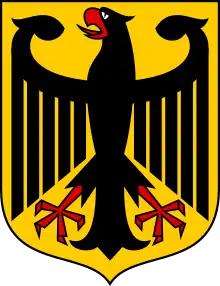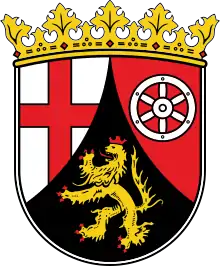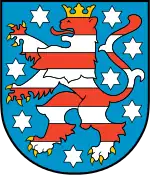Bernhard Vogel
Bernhard Vogel (German pronunciation: [bɛɐnˈhaʁt ˈfɔgəl]; born 19 December 1932) is a German politician (CDU). He was the 4th Minister President of Rhineland-Palatinate from 1976 to 1988 and the 2nd Minister President of Thuringia from 1992 to 2003. He is the only person to have been head of two different German federal states and is the longest governing Minister President of Germany. He served as the 28th and 40th President of the Bundesrat in 1976/77 and 1987/88.
Bernhard Vogel | |
|---|---|
 Vogel in 2015. | |
| President of the Bundesrat | |
| In office 1 November 1987 – 31 October 1988 | |
| Preceded by | Walter Wallmann |
| Succeeded by | Björn Engholm |
| In office 3 December 1976 – 31 October 1977 | |
| Preceded by | Albert Osswald |
| Succeeded by | Gerhard Stoltenberg |
| Minister President of Rhineland-Palatinate | |
| In office 2 December 1976 – 8 December 1988 | |
| Preceded by | Helmut Kohl |
| Succeeded by | Carl-Ludwig Wagner |
| Minister President of Thuringia | |
| In office 5 February 1992 – 5 June 2003 | |
| Preceded by | Josef Duchac |
| Succeeded by | Dieter Althaus |
| Personal details | |
| Born | 19 December 1932 (age 88) Göttingen, Lower Saxony, Germany |
| Relatives | Hans-Jochen Vogel (brother) |
| Alma mater | Heidelberg University Munich University |
Early life and education
Vogel was born in Göttingen. He received his Abitur in Munich in 1953, and began studies in political science, history, sociology, and economics, first in Heidelberg and then in Munich. He received his doctorate in 1960, while working as a research assistant at the Institute of Political Science at the University of Heidelberg. He became a lecturer there the following year, also working in adult education.
Political career
In 1963, Vogel was elected to the municipal council of Heidelberg, but resigned two years later, following his election to the Bundestag. He joined the governing board of the Christian Democratic Union of Germany in the Rhineland Palatinate in 1965. From 1965 to 1967, Vogel was a member of the German Bundestag, a position from which he resigned to assume the job of State Minister of Culture and Education in Rhineland-Palatinate under Minister President Peter Altmeier. He continued in the same cabinet position under Altmeier's successor in 1969, Helmut Kohl. In 1973, when Kohl became chair of the national CDU, Vogel succeeded him as state party chair in Rhineland-Palatinate.
In December 1976, Vogel became Minister-President of Rhineland-Palatinate to replace Kohl, who had been elected a federal deputy. Vogel immediately assumed the presidency of the Federal Council until 31 October 1977, at the same time becoming chairman of the supervisory board of the Zweites Deutsches Fernsehen (ZDF), Germany's second largest public broadcaster. In the regional elections of March 1979 he maintained a bare majority of his party, with 50% of the vote and 51 regional deputies out of 100. In March 1983 the party improved its position, obtaining 52% of the vote and 57 deputies. Vogel became vice-president of the European Democratic Union (EDU) in 1985 and again won the regional elections on 17 May 1987 but with only a plurality of 45.1% of the vote and 48 deputies elected out of 100, ending the sixteen-year absolute majority of Christian Democrats. Vogel's failure to be re-elected as state chair of his party in 1988 led to his resignation as Minister President in a famous speech which he ended with the often-quoted phrase: "May God protect Rhineland-Palatinate!", an unusual display of public piety by German standards.
Life after politics
From 2001 until 2009, Vogel served as president of the Konrad Adenauer Foundation in Berlin.
In 2012 Vogel was awarded the Mercator Visiting Professorship for Political Management at the Universität Essen-Duisburg's NRW School of Governance. He gave both seminars and lectures at the university.[1]
Other activities
Corporate boards
- Deutsche Vermögensberatung (DVAG), member of the advisory board[2]
Non-profit organizations
- CARE Deutschland-Luxemburg, member of the board of trustees[3]
- Eugen Biser Foundation, member of the board of trustees
- European Foundation for the Speyer Cathedral, member of the board of trustees[4]
- Konrad Adenauer Foundation (KAS), member of the board of trustees[5]
- Willy Brandt Foundation, member of the board of trustees[6]
Trivia
During his premiership in Thuringia he earned the nickname Vogelbernie (Vogel translates to bird in English) and therefore his office, the Staatskanzlei Erfurt, got nicknamed Vogelkäfig, which translates to "birdcage" in English.
Personal life
Vogel is a devout Roman Catholic. He is single and has no children. His brother was the SPD politician Hans-Jochen Vogel (1926–2020), a former mayor of Munich and Berlin, federal minister of justice and candidate for chancellorship.
References
- "- Wie Politik die Zukunft gestaltet". Deutschlandfunk (in German). Retrieved 2018-05-24.
- Tobias Romberg (May 19, 2011), Ritter der Schwafelrunde Die Zeit.
- Board of Trustees Archived 2018-08-18 at the Wayback Machine CARE Deutschland.
- Board of Trustees European Foundation for the Speyer Cathedral.
- Board of Trustees Konrad Adenauer Foundation.
- Board of Trustees Willy Brandt Foundation.
- Vogel, Bernhard; Roman Herzog; Michael Borchard; Uwe Spindeldreier (2002). "Lebensstationen". Sorge tragen für die Zukunft: Reden 1998–2002 (in German) (1st ed.). Berlin: Christoph Links Verlag. pp. 237f. ISBN 3-86153-283-2.
![]() Media related to Bernhard Vogel at Wikimedia Commons
Media related to Bernhard Vogel at Wikimedia Commons


